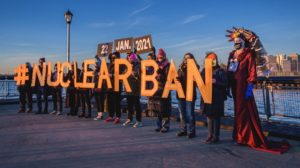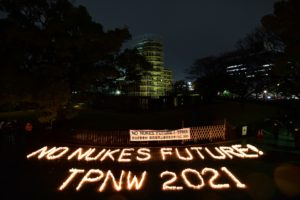U.N. Banning Nuclear Weapons
New York, — The U.N. treaty outlawing nuclear weapons went into effect on Friday, having been ratified by at least 50 countries. But the ban is largely symbolic: The U.S. and the world’s other nuclear powers have not signed the treaty.
“For the first time in history, nuclear weapons are going to be illegal in international law,” Elayne Whyte, Costa Rica’s former U.N. ambassador who oversaw the treaty’s creation, tells NPR’s Geoff Brumfiel.
👏 thank you for your action @NuclearWatchNM! #nuclearban 👇 https://t.co/eo7Ejgvk0X
— ICAN (@nuclearban) January 23, 2021
The ban prohibits countries from producing, testing, acquiring, possessing or stockpiling nuclear weapons. It also outlaws the transfer of the weapons and forbids signatories from allowing any nuclear explosive device to be stationed, installed or deployed in their territory.

The Treaty on the Prohibition of Nuclear Weapons was adopted in the summer of 2017, in hopes of bringing new momentum to the push to curb the deadliest armament in the world. But even then, it was seen more as a moral statement than an enforceable ban.
The treaty is a 96-page reminder to nuclear weapons states, Whyte said, that “they need to be moving forward” with disarmament.
The problem with the ban, global security analysts say, is that while dozens of countries say an outright prohibition is the best way to move ahead with disarmament, others particularly those who possess nuclear weapons disagree. The new treaty has also been seen as potentially undercutting the Nuclear Non-Proliferation Treaty that took effect in 1970. But its backers argue that nonproliferation has stagnated, decades after the U.S. and others agreed to that treaty.
“Supporters of the ban treaty say it serves to delegitimize nuclear weapons and reinforce global norms against use,” the Nuclear Threat Initiative’s Isabelle Williams wrote in 2017. She added later, “the new treaty is clear evidence of the worrying polarization of states — polarization driven, in part, by a perceived complacency among the nuclear-armed states and unwillingness to take serious steps to reduce the risks posed by nuclear weapons.”
The treaty currently has 86 signatories. It has been ratified in 51 of those member states. Early signatories included the Holy See, New Zealand, Thailand and Austria. In the past year, countries such as Belize, Benin and Ireland have ratified or approved the treaty.

Nations that signed the treaty cite “the catastrophic humanitarian consequences that would result from any use of nuclear weapons,” including by accident or miscalculation, saying those effects would transcend international borders.



